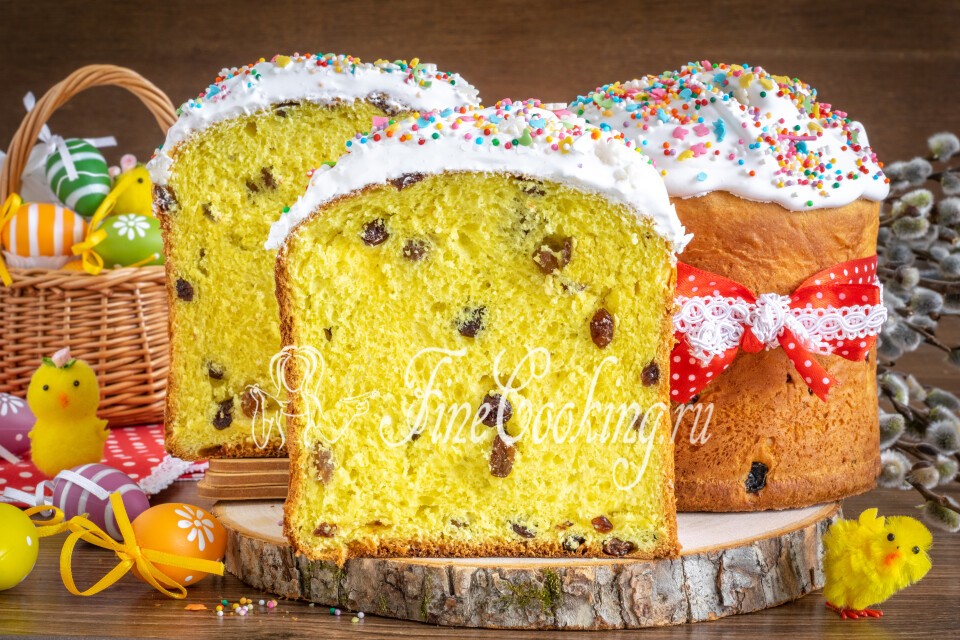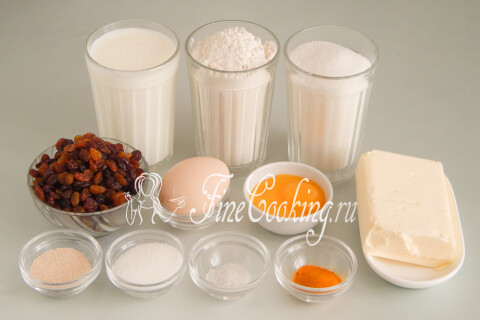Step 1
To prepare delicious and aromatic Easter cakes, we need the following ingredients: wheat flour of the highest grade, kefir, sugar, butter, raisins without bones, chicken eggs and egg yolks, vanillas, high yeast, turmeric and salt. In addition, for glaze and decorations of ready -made festive pastries, we take sugar, egg whites and confectionery sprinkling.
Step 2
Since in the recipe I propose to use high -speed yeast, we will separately prepare the liquid components of the future dough. In a bowl, mix 300 milliliters of warm (slightly) kefir, 150 grams of very soft butter (take it out of the refrigerator in 3-4 hours), one chicken egg and 2 egg yolks. We also add 200 grams of sugar and 1 tablespoon of vanilla sugar (for aroma). In order for the crumb of Easter cakes to be appetizing and cheerful yellow, pour 1 teaspoon of turmeric.
Step 3
Mix everything actively so that the sugar dissolves. Do not wait for the homogeneity of the mass, since the butter is not melted, but soft.
Step 4
Now we go to a dry basis. We sift 600 grams of wheat flour into the container for the batch of dough, add 7 grams (2 teaspoons with a small tubercle) of high -speed yeast and half a teaspoon of salt.
Step 5
Mix so that the yeast with salt is evenly distributed throughout the volume of flour.
Step 6
We pour the liquid mixture (it should be pleasantly warm due to kefir) in dishes with flour.
Step 7
We knead the yeast dough. For these Easter cakes, I made a recipe so that the crumb of the finished pastries was juicy and quite loose. That is why it is advisable to knead the dough in the kitchen combine or with the help of a manual mixer with a hook with a hook. After 12-15 minutes of collapse at an average speed (I turn on 2 of 4 modes), the yeast dough will become smooth and elastic. Additionally, when kneading, I poured another 50 grams of flour (it took 650 grams in total), and you monitor the consistency of the dough. It is moist, very sticky, partially holds its shape, but does not swim. In the process of kneading, be sure to help your kitchen assistant — scrape the flour from the walls and bottom of the dishes so that there is no indelible.
Step 8
We round the dough with a flexible spatula or scraper, cover it with a damp towel and send it for a proof for 1 hour to a warm place without drafts. It is best to spread the yeast dough in the oven with a light bulb on or in a turned off microwave.
Step 9
While the dough wanders, we will engage in the filler for future Easter cakes on kefir. This time I decided to add raisins (150 grams), but you can add other dried fruits, nuts, and centers. Pour raisins with boiling water and leave for 5 minutes, no longer.
Step 10
After that, we transfer to paper towels or napkins so that dried grapes dry.
Step 11
When 1 hour passes, yeast dough should increase in volume at least twice. If this did not happen, you came across stale yeast. Give the dough more time. Add the prepared raisins. A small retreat: so that dried fruits are well held in the dough and do not fall out when kneading and molding, sprinkle raisins with a small amount of flour and shake off excess. To be honest, I just forgot to do it.
Step 12
We intervene raisins into the dough, round it again and give repeated fermentation for another 1 hour.
Step 13
This is how our sunny bun looks after the specified time. The dough has grown 2.5 times — it's time to form it.
Step 14
From the amount of ingredients indicated in the recipe, 3 rather large Easter cakes are obtained. So that you can navigate, I will write the size of my detachable forms. Two blue (diameter — 13 cm, height — 11 cm), one black (diameter — 11 cm, height — 10 cm). So that the finished pastries do not stick to the bottom and walls of the forms, be sure to lay them with high -quality parchment. At the bottom, I put the cuts of paper larger than the diameter, and close the forms. The edges of the parchment that go beyond the walls of the forms are simply turning under the bottoms. For sides, long strips of paper are needed (2-3 cm above the edge of the forms). I lubricate them with a very small amount of refined vegetable oil on both sides and insert them into the molds, pressing against the walls. Thanks to the clock, they stick, do not twist and do not deform. Lubricating the hands with the same butter, crush the yeast dough, right in the hands slightly round it and lay it into the molds. In height, the dough should fill the forms no more than 1/3. The maximum is half, but then there is a chance that during baking the dough will run away.
Step 15
We cover the workpieces with a light wet towel or cling film and give a distance in a warm place until an increase in volume is doubled. My test needed 70 minutes.
Step 16
In advance, we turn on the oven to heat up by 170 degrees (it is not necessary above, since the dough is very butter). Gently, in order not to disturb the dough, we put the forms to the average level and cook for about 30-35 minutes. I have an electric oven, lower heating, without convection. A wooden skewer or toothpick should come out of dry dough.
Step 17
We take out ready-made Easter cakes, let them cool for 5-7 minutes in the forms, and then remove them. We remove parchment paper and leave to cool on the table.
Step 18
There is just time to prepare protein glaze and decorate the festive pastries. For decor, I propose to make a Swiss meringue on egg whites and sugar, and then give solemnity to confectionery sprinkling.
Step 19
Pour 2 egg protein into the container, pour 140 grams of sugar. Conventional proportions for merengi — per 1 part of protein 2 parts of sugar. Since the chicken eggs were large, the proteins were scorched not 60, but 70 grams.
Step 20
In a separate pan, we bring a glass of water to a boil and place a container with sugar and proteins in it. We warm the contents, constantly interfering, in a water bath until sugar was dissolved.
Step 21
If you have a culinary thermometer, wait for 60 degrees. You can do without it — the mixture should be decently warm, and when rubbing between the fingers, sugar crystals will no longer be felt. Just do not overheat, otherwise cook the protein!
Step 22
It remains to beat the Swiss meringue to the snow -white glossy color and stability. At high speeds, a powerful mixer will cope in 5-7 minutes.
Step 23
We apply a white hat on a slightly warm or already cooled cakes. You can just a spoon, but you want — with a culinary bag with a nozzle.
Step 24
Immediately decorate with confectionery sprinkles (a tablespoon is enough for 3 cakes). Tip: so that sprinkle does not scatter on the table and floor, put the Easter cakes in a deep baking sheet.
Step 25
That's all, our sunny Easter cakes on kefir are ready. A few hours later, a thin crust will appear on the meringue, but inside the cream will remain soft. This kulich I cut immediately after cooking (it was still a little warm), so even behind a knife-saw, the crumb was stuck and rolled up. I was really eager to try …
Step 26
But this handsome man cut more size in an hour. It is already clear how gentle, finely porous, juicy and appetizing. A lot of raisins are so tasty! With the upcoming light Easter, friends — prepare for health, successful Easter cakes and pleasant appetite!


























